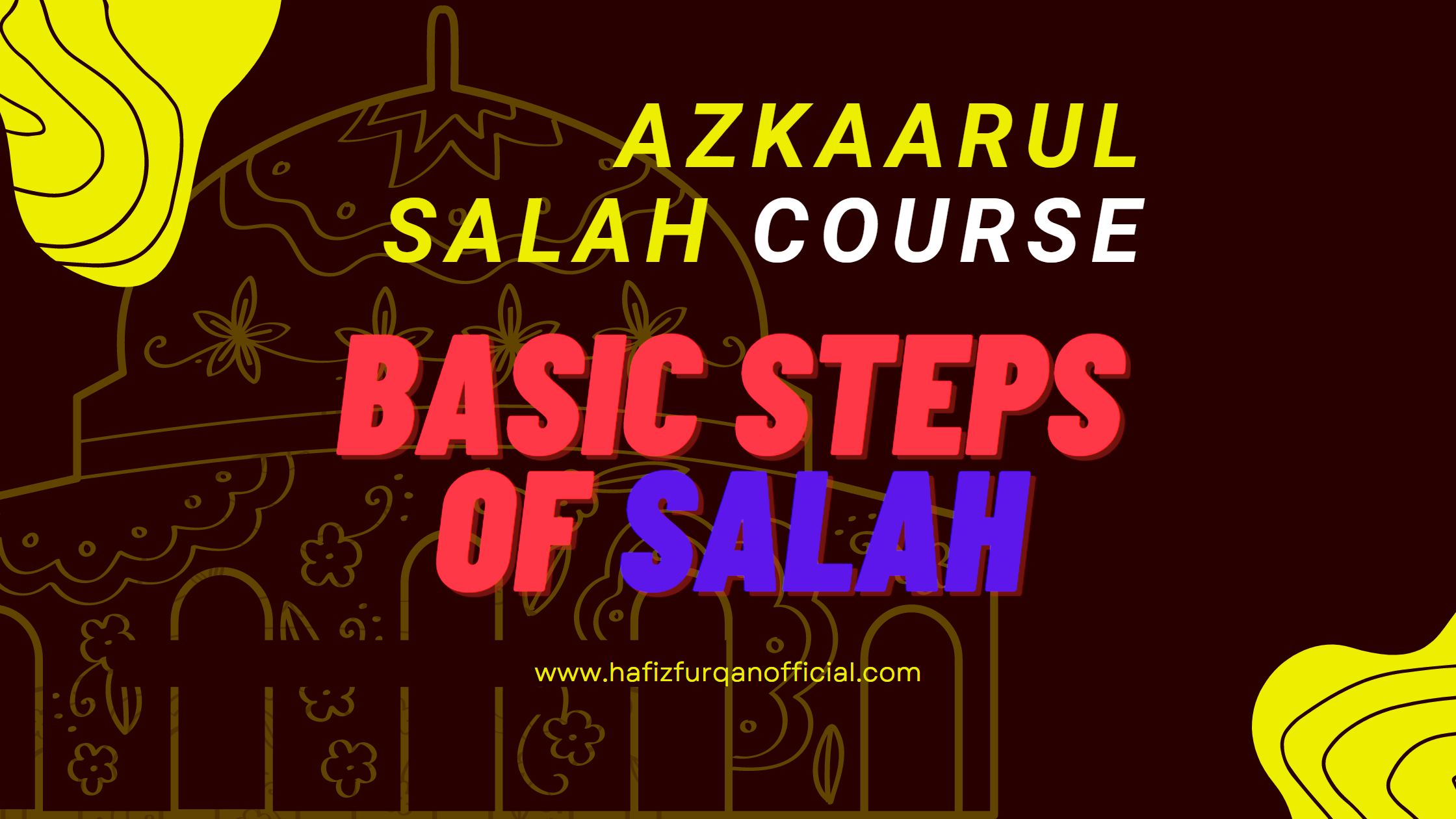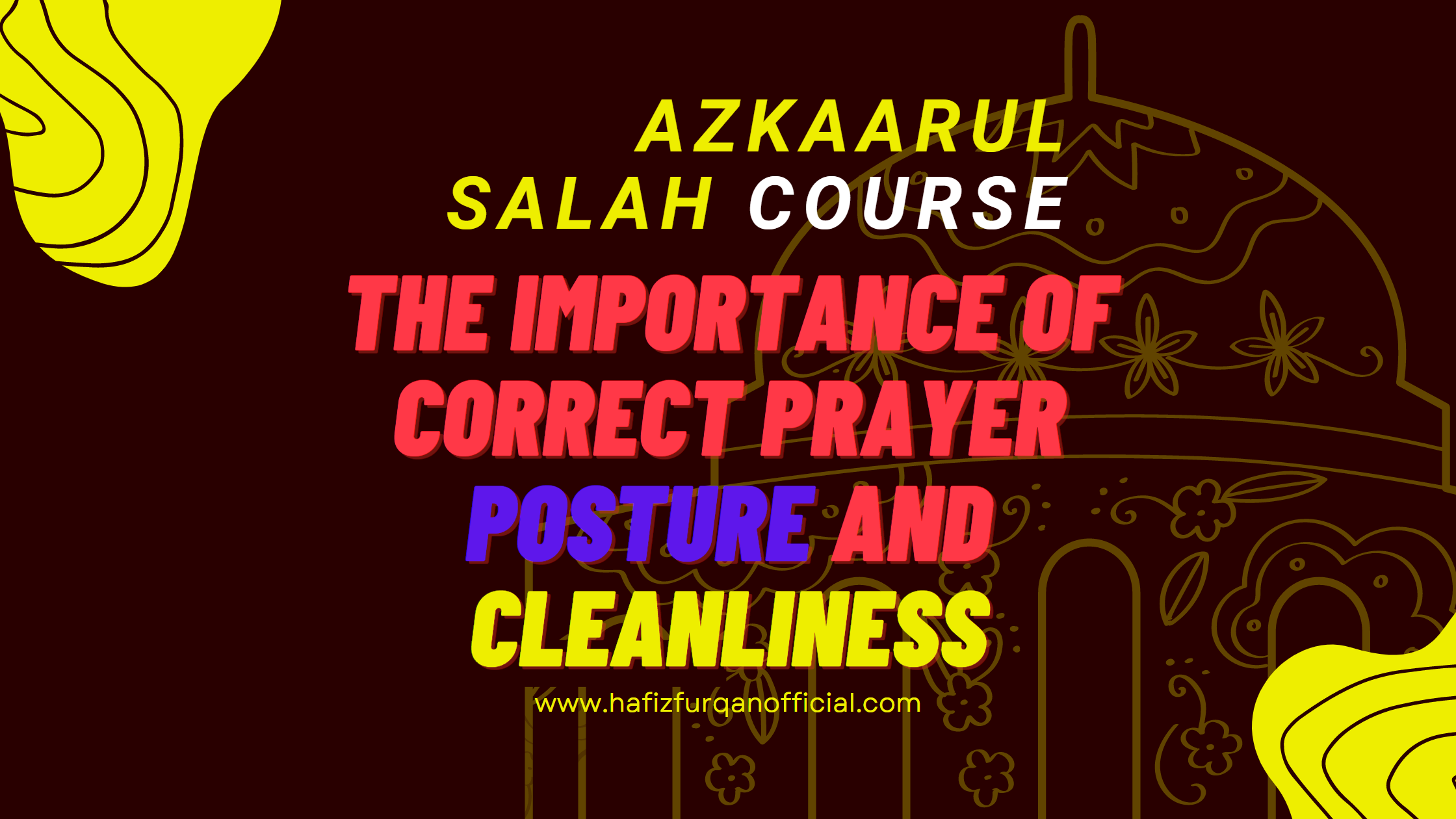We will be learning about those four Lessons in the first Chapter of the Azkaarul Salah Course.
-
Recitation, Practice, translation, and Memorization of Takbeer and Thanaa.
-
Overview of Salah and its significance in Islam
-
Basic steps of Salah
-
Importance of correct prayer posture and cleanliness
Azkaarul Salah Checklist

1) Recitation, Practice, translation, and Memorization of Takbeer and Thanaa.

1) Takbeer


2) Thanaa


2) Overview of Salah and its significance in Islam

Salah, also known as prayer, Namaaz, or salat, is an integral part of the Islamic faith and is one of the five pillars of Islam. It is a physical, mental, and spiritual act of worship that Muslims perform five times a day, at specific times, as ordained by Allah in the Quran. This essay aims to provide an overview of Salah and its significance in Islam.
Salah is a way for Muslims to connect with Allah, seek His guidance, and ask for His forgiveness. It is a reminder of one’s duties and responsibilities as a Muslim, and it is an act of obedience to Allah. Muslims believe that Salah is essential for their spiritual well-being, as it purifies the heart, strengthens the faith, and brings them closer to Allah. Through Salah, Muslims also remember the Prophet Muhammad, who established the practice of Salah during his lifetime.
The obligatory Salah consists of five daily prayers, performed at specific times throughout the day. The first prayer, Fajr, is performed before sunrise; the second, Zuhr, is performed after midday; the third, Asr, is performed in the late afternoon; the fourth, Maghrib, is performed just after sunset; and the fifth, Isha, is performed at night. Each prayer consists of a specific number of rak’ahs (units of prayer) and includes recitation of verses from the Quran, standing, bowing, prostration, and sitting. The prayers are performed facing the Kaaba in Mecca,
The Importance of Salah from the Quran.
The importance of Salah can be traced back to the Quran and Hadith.
In the Quran, Allah (SWT) says,
And when you have completed the prayer, remember Allāh standing, sitting, or [lying] on your sides. But when you become secure, re-establish [regular] prayer. Indeed, prayer has been decreed upon the believers a decree of specified times. Quran 4:103
When you travel through the land, it is permissible for you to shorten the prayer—˹especially˺ if you fear an attack by the disbelievers. Indeed, the disbelievers are your sworn enemies. (Quran 4:101)
In several other verses, Allah (SWT) commands Muslims to establish Salah and maintain it with diligence. For example, in Surah Al-Baqarah, Allah (SWT) says,
“And establish prayer and give zakah and bow with those who bow [in worship and obedience]” (Quran 2:43).
This verse emphasizes the need for Muslims to establish Salah and perform it in congregation with other believers.
The significance of Salah can also be found in numerous Hadith narrations.
The Prophet Muhammad (PBUH) said,
“The first matter that the slave will be brought to account for on the Day of Judgment is the prayer. If it is sound, then the rest of his deeds will be sound. And if it is bad, then the rest of his deeds will be bad” (Tirmidhi).
This Hadith emphasizes the importance of Salah and how it serves as the foundation for all other good deeds.
The Prophet Muhammad (PBUH) also said,
“The coolness of my eyes is in prayer” (Ahmad),
highlighting the spiritual significance and personal fulfillment that Salah brings to the believer.
Salah is not only a physical act of worship but also a mental and spiritual one. It requires concentration, mindfulness, and humility, and it is a way to seek Allah’s mercy, forgiveness, and guidance. Salah also promotes discipline, punctuality, and orderliness in one’s life, as it requires Muslims to perform their prayers at specific times throughout the day.
Salah has numerous benefits for Muslims, both individually and collectively. Individually, Salah provides a sense of inner peace, tranquility, and spiritual satisfaction. It is a way to seek Allah’s help and guidance in one’s daily life, and it is a means to strengthen one’s relationship with Allah. Collectively, Salah is a way to unite Muslims, regardless of their race, ethnicity, or nationality. It is a way to establish brotherhood, sisterhood, and a sense of community among Muslims worldwide.
conclusion,
Salah is an essential part of the Islamic faith, and it is a way for Muslims to connect with Allah, seek His guidance, and ask for His forgiveness. It is a reminder of one’s duties and responsibilities as a Muslim, and it is an act of obedience to Allah. Through Salah, Muslims seek inner peace, spiritual satisfaction, and a stronger relationship with Allah. Salah also promotes discipline, punctuality, and unity among Muslims worldwide.
3 ) Basic steps of Salah

Salah is an integral part of the Islamic faith, and it is essential to perform it in the right way.
Here are the basic steps of Salah.
1) Make Wudu and Cleanliness:
Before Salah, it is necessary to perform Wudu (ablution), which involves washing the face, hands, arms, head, and feet. This is to ensure cleanliness and purity before performing Salah.
2) Check The Time of Salah:
Performing Salah at the correct time is significant in Islam because it reflects the importance of punctuality and discipline in one’s spiritual life.
Allah (SWT) commands believers in the Quran to
“guard strictly the (five obligatory) prayers, especially the middle prayer” (Quran 2:238),
emphasize the importance of performing Salah at the prescribed times.
Checking the Salah time can be done through various means, such as using a prayer timetable, a mobile application, or a mosque’s announcement. It is essential to keep track of the Salah time and plan daily activities accordingly to ensure that prayer is not missed or delayed.
Delaying or missing Salah is considered a sin in Islam and can have negative consequences on one’s spiritual well-being. The Prophet Muhammad (PBUH) said,
“Whoever misses the Asr prayer, it is as if he has lost his family and property” (Bukhari).
This Hadith highlights the severity of neglecting Salah and the importance of performing it at the prescribed time
3) Stand facing the Qiblah:
The Qiblah is the direction of the Kaaba in Mecca, and Muslims face it when performing Salah. If you don’t know the direction, you can use a compass or a Qiblah locator app.
4) Say the Takbir:
Begin Salah by saying the Takbir, which means “Allahu Akbar” (Allah is the Greatest). Raise your hands to your ears and say the Takbir, then place your right hand over your left hand on your chest.
5) Recite Thanaa:
Thanaa is the recitation of praise and gratitude to Allah, usually recited at the beginning of a gathering or a session of worship. It is an essential part of Islamic etiquette and serves as a reminder of the importance of expressing gratitude to Allah.
Reciting the Thanaa (praise) at the beginning of Salah is considered a recommended act in Islam. before beginning the recitation of Surah Al-Fatihah in Salah.
The importance of reciting Thanaa is mentioned in several Hadith narrations.
The Prophet Muhammad (PBUH) said,
“When one of you stands for prayer, let him say: ‘Subhanakallahumma wa bi hamdika wa tabarakasmuka wa ta’ala jadduka wa la ilaha ghairuk.’ For it is the beginning of the Quran and nothing but the truth” (Tirmidhi).
6) Recite Surah Al-Fatihah and other Verses:
Recite Surah Al-Fatihah, the first chapter of the Quran, in every Rak’ah (unit of prayer). This is followed by reciting other verses of the Quran or other supplications.
7) Perform Ruku:
Bow down and place your hands on your knees, saying “Subhana Rabbiyal Adheem” (Glory be to my Lord, the Highest) three times.
8) Perform Sujood:
Prostrate on the ground, placing your forehead, nose, hands, knees, and toes on the floor. Say “Subhana Rabbiyal A’la” (Glory be to my Lord, the Highest) three times.
9) Sit for Tashahhud:
After completing the Sujood, sit down and recite the Tashahhud, which is a short supplication praising Allah and sending blessings upon the Prophet Muhammad (peace be upon him).
10) End Salah:
End Salah by turning your head to the right and saying “Assalamu Alaykum wa Rahmatullah” (Peace be upon you and the mercy of Allah) and then turning your head to the left and saying the same thing.
conclusion,
understand the importance of performing Salah correctly and the significance of each step. Encourage yourself to practice Salah regularly and remind yourself that it is a way to seek Allah’s guidance, mercy, and forgiveness.
4) The importance of correct prayer posture and cleanliness

Correct prayer posture and cleanliness are emphasized in the Quran and Hadith. In this article, we will see the importance of correct prayer posture and cleanliness from the references to the Quran and Hadith. Firstly,
the Quran emphasizes the importance of correct prayer posture in several verses.
In Surah Al-Baqarah, Allah says:
“And establish prayer and give Zakat and bow with those who bow” (Quran 2:43).
This verse emphasizes the importance of bowing during prayer, which is a critical aspect of correct prayer posture.
In Surah Al-Imran, Allah says:
“O you who have believed, bow and prostrate and worship your Lord and do good – that you may succeed” (3: 31).
This verse emphasizes the importance of prostration and worshiping Allah with humility and submission, which is achieved through correct prayer posture.
Moreover,
the Hadith also emphasizes the importance of correct prayer posture.
The Prophet Muhammad (peace be upon him) said:
“Pray as you have seen me praying” (Sahih Bukhari).
This Hadith emphasizes the importance of following the example of the Prophet Muhammad (peace be upon him) in all aspects of life, including prayer posture. The Prophet Muhammad (peace be upon him) was known to have a humble and focused demeanor during prayer, which is reflected in his correct prayer posture.
The Importance of Cleanliness
the Quran emphasizes the importance of cleanliness in several verses.
In Surah Al-Ma’ida, Allah says:
“O you who believe! When you stand up for prayer, wash your faces, and your hands up to the elbows, and wipe your heads, and wash your feet up to the ankles” (5:6).
This verse emphasizes the importance of Wudu, which is a form of cleanliness before prayer.
In Surah Al-Baqarah, Allah says:
“Truly, Allah loves those who turn to Him constantly and He loves those who keep themselves pure and clean” (2:222).
This verse emphasizes the importance of cleanliness and purity in Islam.
Moreover,
the Hadith also emphasizes the importance of cleanliness.
The Prophet Muhammad (peace be upon him) said:
“Cleanliness is half of faith” (Sahih Muslim).
This Hadith emphasizes the importance of cleanliness in Islam and its role in maintaining spiritual purity.
conclusion,
correct prayer posture and cleanliness are integral parts of the Islamic faith, emphasized in the Quran and Hadith. Correct prayer posture reflects humility and submission to Allah, while cleanliness promotes hygiene and spiritual purity. encourage yourself to incorporate these practices into your daily lives.







